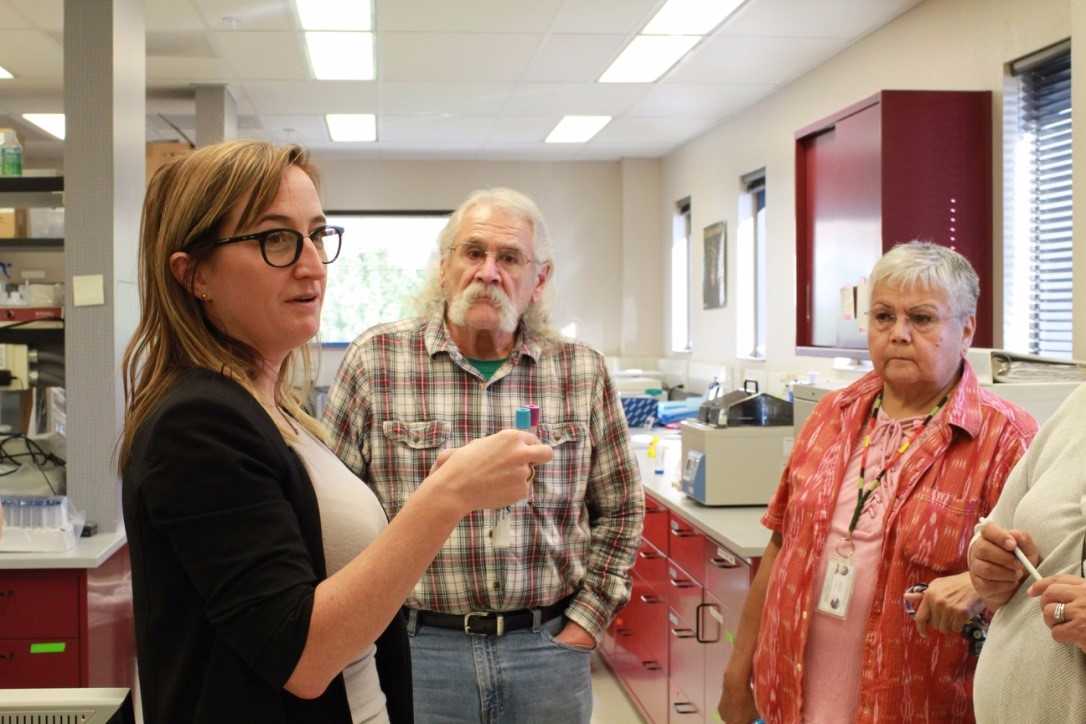Genetic and Seasonal Variability of Vitamin D Among American Indian People
Project Leader: Dr. Erica Woodahl | University of Montana

UM researcher Erica Woodahl explains laboratory procedures to Confederated Salish and Kootenai Tribes - Community Pharmacogenetics advisory council members Steve Lozar and Cheryl Mathias.
Abstract
The overall goal of this proposed research is to understand how diet, genetics, and sunlight contribute to vitamin D homeostasis and optimal health in American Indian and Alaska Native people. AI/AN people experience numerous health disparities, yet health research addressing these concerns is limited, and resulting culturally appropriate interventions based on community research priorities are rare. Our partnership between the University of Montana (UM) and the Confederated Salish and Kootenai Tribes (CSKT) on the Flathead Reservation in western Montana, established in 2007, is one of only a few research partnerships in the country focused on pharmacogenomics and precision medicine research with AI/AN communities. Our community-academic partnership was founded on the principles of community-based participatory research to engage the community and to build a trustworthy research partnership. Our broad goal is to determine how precision medicine might fit within clinical care at CSKT Tribal Health facilities. The objectives of this pilot project are to focus on interindividual variability in vitamin D deficiency, as measured by the major circulating metabolite of vitamin D, 25-hydroxyvitamin D3 [25(OH)D3]. Vitamin D is obtained through synthesis in the skin following exposure to ultraviolet B radiation and dietary intake. There is a growing concern worldwide about the development of chronic diseases associated with vitamin D deficiency, including osteoporosis, depression, diabetes, cardiovascular diseases, autoimmune disorders, and cancer. Vitamin D deficiency is of particular concern to populations living in northern latitudes where there is reduced sunlight exposure in winter months. This proposal is responsive to community research priorities, where CSKT Tribal Health providers have reported low 25(OH)D3 levels and increased burden of vitamin D associated diseases in the CSKT population. This clinical evidence compelled a comprehensive study of vitamin D deficiency and the sources of interindividual variability in 25(OH)D3 levels. We hypothesize that seasonal variation in vitamin D and genetic variation in genes important in vitamin D homeostasis are major factors affecting plasma 25OHD3 levels in the CSKT community. We will quantitatively measure the seasonal variability of plasma 25OHD3 levels in a cross-section of CSKT participants (Aim 1) and resequence 12 candidate genes important in vitamin D homeostasis (Aim 2) and make associations between genetic variation, seasonal sunlight exposure, and interindividual variability in plasma 25OHD3 levels. The data generated from this precision medicine research proposal will provide the basis for an R01 grant application for a longitudinal evaluation of how dietary, genetic, and environmental factors affect plasma 25OHD3 levels and aid in the design of interventional studies to improve vitamin D sufficiency in CSKT people.
